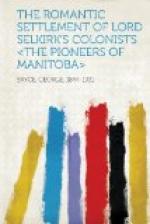A.N. McLeod now became the superior officer in the Fort and made preparation for defending it. He himself occupied the late Governor Semple’s quarters and passed out compliments to white and native alike, praising them for their daring, their adroitness and their success. A great meeting was then gathered in the Governor’s apartments and a levee was held at which all of the servants and employees of the Company were present, and in a speech McLeod told the audience that the English had no right to build upon their lands without their permission—a new doctrine surely.
Leaving Fort Douglas McLeod with his officers and the Bois-brules all mounted, made an imposing procession up to the site of old Fort Gibraltar. Here Peguis, now the chief of the Saulteaux who had shown such kindness to the settlers was camped, and to him and his followers McLeod showed his great displeasure. The Indian always loved the British-man, whom on the west coast he called, “King Shautshman,” or King George’s man.
The Indian is taciturn, unemotional, and cautious. He knew that the Bois-brules had assumed their garb and committed the outrage of Seven Oaks, and therefore the tribe were unwilling to be under the stigma being thrown upon them. When McLeod had failed in his appeal, he laid many sins to their charge. They had allowed the English to carry away Duncan Cameron to Hudson Bay, they were a band of dogs, and he would count them always as his enemies if they should hold to their English friends. Peguis, who was a master diplomat, looked on with attention and held his peace.
It was now about a week from the time of the massacre. Huerter, the discharged soldier spoken of, rode down with a party from the Fort to the field of Seven Oaks. He saw a number of human bodies scattered on the plain, and in most cases the flesh had been torn off to the bone, evidently by dogs and wolves.
Far from discouraging the talkative half-breeds, whose blood was up with the sights of carnage, McLeod and his fellow-officers expressed their approbation of the deeds done, and the Bois-brules became boisterous in detailing their victories. The worst of the whole, old Deschamps, a French-Canadian, who murdered the disabled even when they cried for quarter, drew forth as he detailed his valorous actions to Alexander Macdonell, the exclamation, “What a fine, vigorous old man he is!” On the evening of this Red-letter day of the visit to the Indian encampment and to Seven Oaks, a wild and heathenish orgy took place. The Bois-brules bedecked their naked bodies with Indian trinkets and executed the dance of victory, as had done their savage ancestors. The effect of these dances is marvellous. By a contagious shout they excite each other. They reach a frenzy which communicates itself with hypnotic effect to the whole dancing circle. At times men tear their hair, cut their flesh or even mutilate their limbs for life. The “tom-tom,” or Indian drum, adds to the power of monotonous rhythm and to the spirit of excitement and frenzy.




